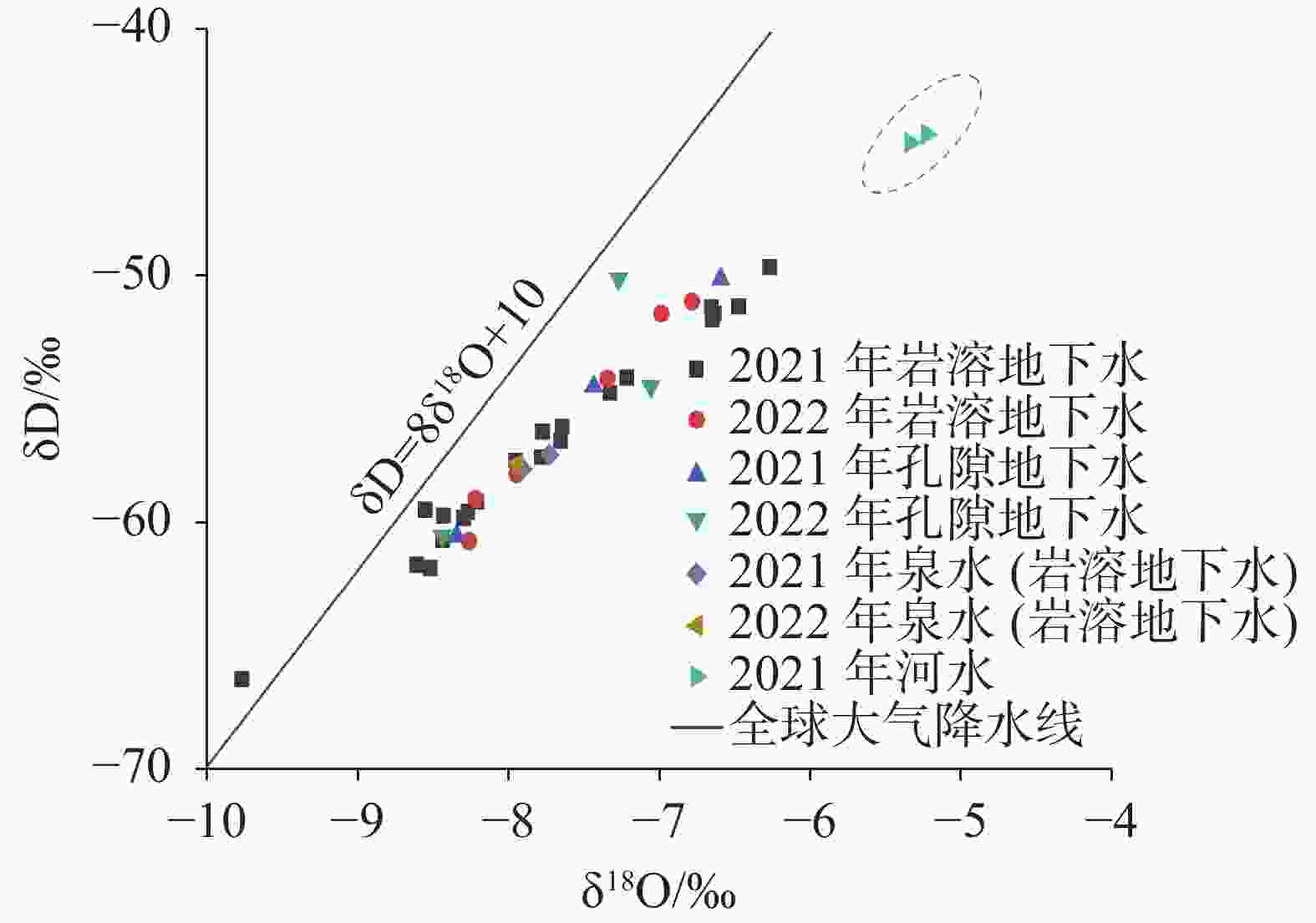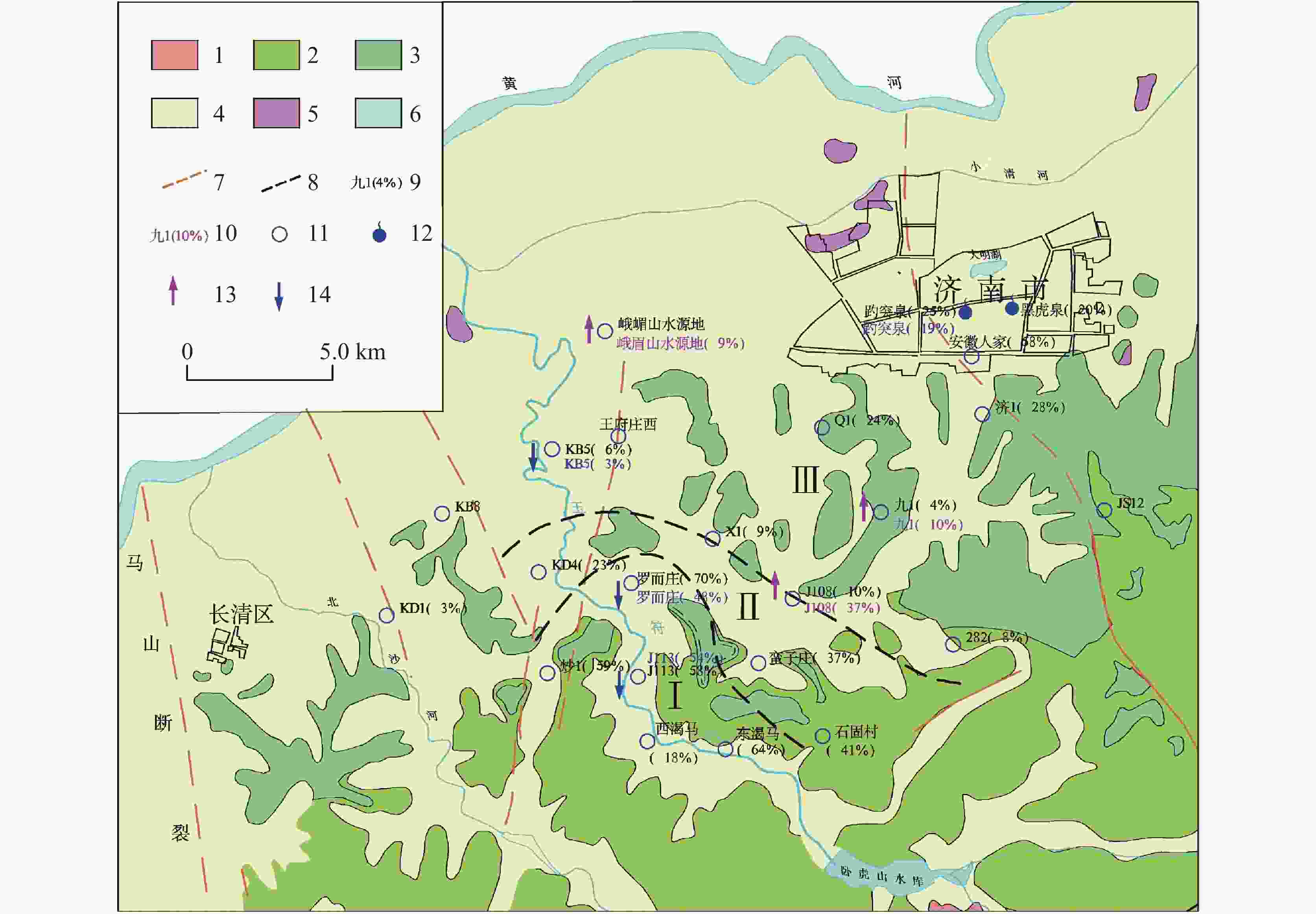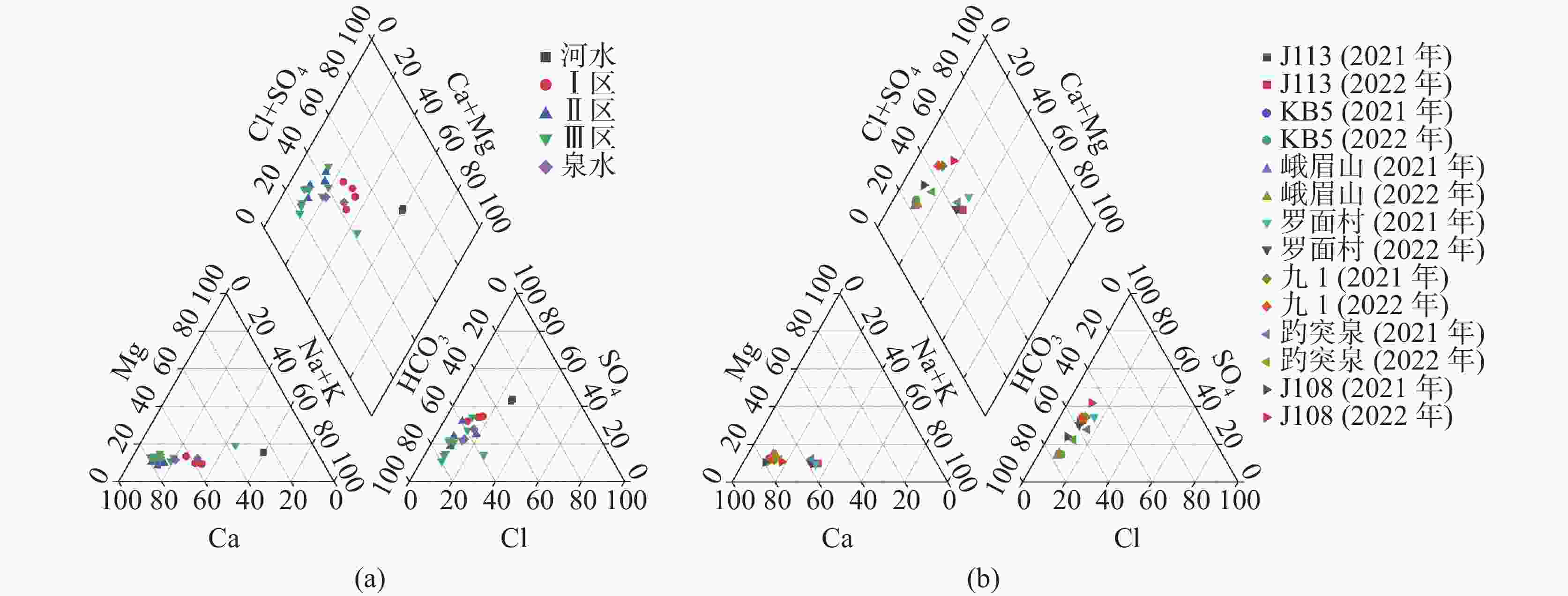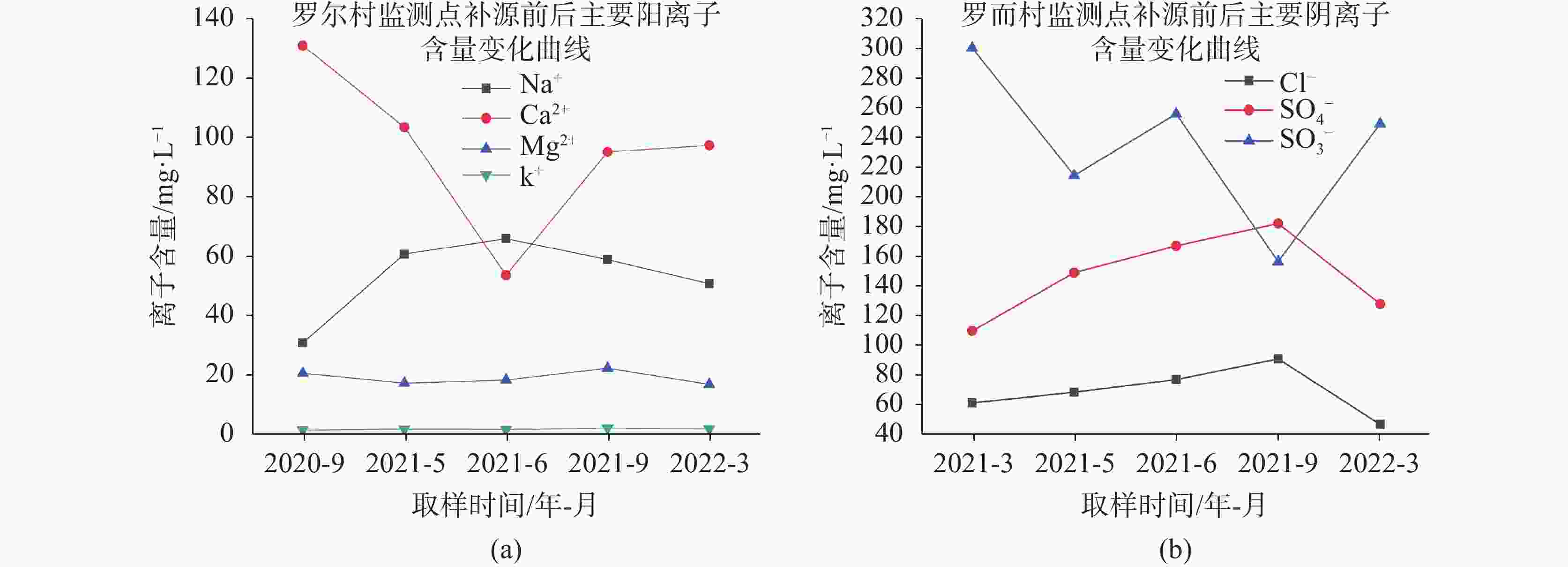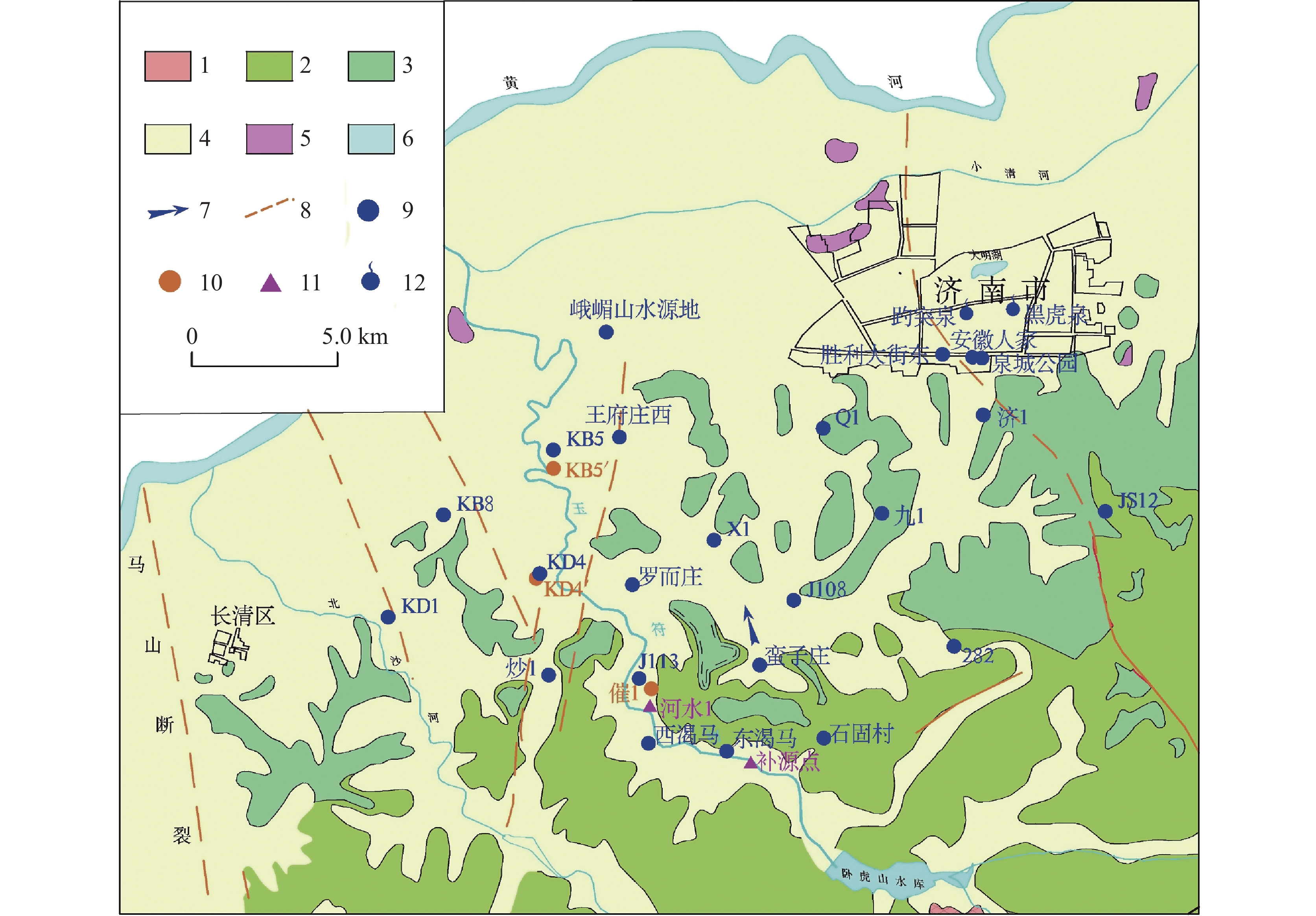Study on the influence of external recharge of Yufu river on karst groundwater
-
摘要: 为缓解济南市的泉水保护与城市供水矛盾,玉符河先后实施了多期地表水回灌补源地下水工程,对维持泉水持续喷涌下城市正常取用地下水起到了重要作用。外源水水质与当地岩溶水差异明显,长期回灌将对岩溶水产生一定影响。针对这一问题,以2021—2022年玉符河的回灌补源为例,利用同位素试验和水化学综合分析等多种手段相结合的方式,研究玉符河流域岩溶水受外源水补给的影响,分析影响区内地下水水化学特征及其组分的变化趋势。结果表明:玉符河回灌对岩溶水有一定的补给作用,根据其补给的程度将研究区分成三个区带,在河岸东侧Ⅰ区范围内河流入渗补给占50%以上,是主要的影响区;城区泉群位于Ⅲ区内,水质受玉符河补源影响有限,但水位会有一定的抬升。自玉符河至Ⅲ区,水化学类型由SO4·Cl-Na·Mg型逐渐向HCO3-Ca·Mg型过渡,由于兴济河的调水补源,泉群地下水类型又转变为HCO3·SO4-Ca·Mg型。影响区内岩溶水各离子含量变化主要是河水与岩溶水的物理混合引起,同时伴随着水岩平衡的改变。补源经过一个水文年后,各离子逐步接近原来含量水平。研究成果为科学实施玉符河回灌补源提供了依据,对促进保泉与供水的有机统一具有一定意义。Abstract:
Jinan is famous for its abundant spring water resources, but with the advancement of urbanization, the ground continues to harden, resulting in a significant reduction of the area effectively supplying karst water, and hence a sudden decrease in water supply. The decrease has seriously threatened the continuous gushing of spring water in Jinan. At the same time, the urban population is constantly rising, so is the demand for water supply. The contradiction between spring water protection and urban water supply is becoming increasingly serious. In order to alleviate the contradiction in Yufu river, the projects in which groundwater was recharged by surface water were completed in different phases. In these projects such as the water discharge project of the Wohushan reservoir, the project of converting surface water into groundwater, and the Jinan City project of the East Line of the South-to-North Water Diversion Project, the surface water from the Wohushan reservoir, the Yuqing lake reservoir, and the Yangtze River has been respectively used for the recharging. They play an important role in maintaining the continuous gushing of spring water for the normal use of groundwater in cities. In the South-to-North Water Diversion Project, water from the Yangtze River is significantly different from local karst water in quality. Therefore, long term recharging will have a certain impact on karst water. In response to this issue, taking the recharging source of the Yufu river from 2021 to 2022 as an example, we studied the impact of external water supply on karst water in the Yufu river basin, and analyzed the hydrochemical characteristics and the change of hydrochemical composition of groundwater in the affected area. In order to fulfill the research purpose, we used isotope testing and comprehensive hydrochemical analysis. The results show that the recharging of the Yufu river has a certain replenishment effect on karst water. According to its degree of replenishment, the research area is divided into three zones. After two months of replenishment, Zone I is distributed on the east bank of the Yufu river, with the highest mixing ratio of river water in karst water, ranging from 50% to 70%, and is most affected by river water replenishment. Within a certain range of the periphery of Zone I, the proportion of river water in Zone II is 10% to 50%, and the degree of influence of infiltration river water on karst water isotopes and hydrochemistry decreases. Zone III is far away from the Yufu river, with river water accounting for less than 10% and less affected by the river water. After 11 months of replenishment, the proportion of river water in the karst water monitoring points in Zone I has decreased, but the proportion is still around 50%, indicating that Zone 1 is still the main affected area for river water replenishment. The proportion of river water in monitoring points in Zone II has significantly increased, with J108 reaching 37%, indicating that the impact range of river water has expanded to Zone II. The proportion of river water in monitoring points in Zone III has also increased, but it is not significant with the percentage of around 10%, indicating the limited impact from river water. The hydrochemical characteristics of river water from the external source are significantly different from those of karst water and spring water. The hydrochemical type of river water is SO4·Cl-Na·Mg type, while the karst water is mainly HCO3-Ca·Mg type and HCO3-Ca type. Spring water is influenced by the replenishment of Xingji river with HCO3·SO4-Ca·Mg type. Two months later, the hydrochemical type of groundwater has gradually transitioned from SO4·Cl-Na·Mg type to HCO3-Ca·Mg type in the water source area of the western suburb along Yufu river. Due to the water diversion and replenishment of the Xingji river in the direction of the spring group, the groundwater type first changed from SO4·Cl-Na·Mg type to HCO3-Ca type, and then transitioned to HCO3·SO4-Ca·Mg. The recharging of water from the external source has a certain impact on the quality of the local karst water. The changes in the ion content of karst water in the affected area are mainly caused by the physical mixing of river water and karst water, accompanied by changes in water-rock balance. After a hydrological year, each ion gradually approaches its original content level after supplementing the source. The research results provide a basis for the scientific implementation of recharging and replenishment of the Yufu river, and have certain significance in promoting the organic unity of spring protection and water supply. This article does not consider the impact of seasonal atmospheric precipitation on groundwater hydrochemistry and isotopes. The atmospheric waterline used for isotope analysis is not the local atmospheric waterline, and these issues may have a certain impact on the results obtained, which is a topic that we need to further study. -
Key words:
- Yufu river /
- karst water /
- isotope /
- hydrochemistry /
- external water recharge /
- groundwater
-
图 1 地质及监测点布置图
1-泰山群变质岩 2-寒武系灰岩 3-奥陶系灰岩 4-第四系 5-闪长岩 6-河流、水库 7-岩溶水流向 8-断裂 9-岩溶水取样点 10-孔隙水取样点 11-补源点 12-泉群
Figure 1. Layout of monitoring points and geology map
1-Metamorpgic rocks of Taishan Group 2-Cambrian limestone 3-Ordovician limestone 4- Quaternary 5-Diorite 6. Rivers and reservoirs 7-Karst flow direction 8-Fracture 9-Sampling site of karst water 10- Sampling site of pore water 11-Replenishment point 12-Spring groups
图 3 玉符河补源对岩溶水影响成果图
1-泰山群变质岩 2-寒武系灰岩 3-奥陶系灰岩 4-第四系 5-闪长岩 6-河流、水库 7-断裂 8-分区界线 9-补源2个月各监测点河水占比 10-补源11个月各监测点河水占比 11-岩溶水监测点 12-泉群 13-河水占比上升 14-河水占比下降
Figure 3. Impact of the recharging of Yufu river on karst water
1-Metamorpgic rocks of Taishan Group 2-Cambrian limestone 3-Ordovician limestone 4- Quaternary 5-Diorite 6. Rivers and reservoirs 7-Fracture 8-Zoning boundary 9-Proportion of river water at each monitoring site during 2 months' replenishment 10-Proportion of river water at each monitoring site during 11 months' replenishment 11- monitoring point of karst water 12-Spring groups 13-Rise of proportion of river water 14-Decrease of proportion of river water
表 1 地下水水化学参数分析结果表
Table 1. Analysis results of groundwater chemical parameters
统计值 pH k+ Na+ Ca2+ Mg2+ Cl− ${\rm{SO}}_4^{2-}$ ${\rm{HCO}}_3^{-}$ ${\rm{NO}}_3^{-}$ TDS 最小值 7.30 0.39 10.90 4.98 0.91 14.00 37.30 55.06 0.67 163.68 最大值 8.10 17.50 61.00 226.00 28.60 105.00 184.00 385.43 178.00 873.89 平均值 7.62 2.32 32.57 118.55 19.75 51.38 104.22 254.17 36.92 499.23 标准差 0.21 3.55 15.40 44.07 5.42 22.18 39.64 67.25 38.41 139.17 变异系数 0.03 1.53 0.47 0.37 0.27 0.43 0.38 0.26 1.04 0.28 -
[1] 王开然, 吴振, 傅世东, 仇钰婷, 陈华伟. 济南泉域岩溶水系统水化学演化及成因分析[J]. 地球化学, 2023, 52(5): 547-558.WANG Kairan, WU Zhen, FU Shidong, QIU Yuting, CHEN Huawei. Hydrochemical evolution and genesis analysis of karst water system in the Jinan spring basin[J]. Geochimica, 2023, 52(5): 547-558. [2] 刘文悦, 高宗军, 徐源, 韩聪, 罗振江, 赵振华. 济南市岩溶地下水化学特征及基于模糊评价法的水质评价[J]. 中国岩溶, 2023, 42(2): 220-232, 244.LIU Wenyue, GAO Zongjun, XU Yuan, HAN Cong, LUO Zhenjiang, ZHAO Zhenhua. Hydrochemical characteristics and water quality evaluation of karst groundwater in Jinan City[J]. Carsologica Sinica, 2023, 42(2): 220-232, 244. [3] 管清花, 李福林, 王爱芹, 冯平, 田婵娟, 陈学群, 刘丹. 济南市岩溶泉域地下水化学特征与水环境演化[J]. 中国岩溶, 2019, 38(5):653-662. doi: 10.11932/karst20190501GUAN Qinghua, LI Fulin, WANG Aiqin, FENG Ping, TIAN Chanjuan, CHEN Xuequn, LIU Dan. Hydrochemistry characteristics and evolution of karst spring groundwater system in Jinan[J]. Carsologica Sinica, 2019, 38(5):653-662. doi: 10.11932/karst20190501 [4] 李宝学, 秦大军, 郭艺, 刘文才, Mohammed Haji, 林琳, 管清花. 玉符河对济南岩溶水化学过程的影响研究[J]. 工程地质学报, 2017, 25(1):190-198. doi: 10.13544/j.cnki.jeg.2017.01.025LI Baoxue, QIN Dajun, GUO Yi, LIU Wencai, Mohammed Haji, LIN Lin, GUAN Qinghua. Effect of Yufu river on chemical process of karst groundwater in Jinan, Shandong Province[J]. Journal of Engineering Geology, 2017, 25(1):190-198. doi: 10.13544/j.cnki.jeg.2017.01.025 [5] Clark I D, Fritz P. Environmental Isotopes in Hydrogeology (1st edition)[M]. Florida: CRC Press, 1997. [6] Kendall C. Isotope tracers of water and solute sources in catchments[J]. Solute Modeling in Catchment Systems, 1995: 261-303. [7] Fritz P, Cherry J, Sklash M, Weyer K. Storm runoff analysis using environmental isotopes and major ions[J]. IAEA, 1976. DOI: 10.1080/15732479.2010.497540. [8] Rodhe A. Groundwater contribution to stream flow in Swedish forested till soil as estimated by oxygen-18[J]. Isotope Hydrology, 1983, 270:55-66. [9] Sklash M G, Farvolden R N. The role of groundwater in storm runoff[J]. Journal of Hydrology, 1979, 43(1-4):45-65. doi: 10.1016/0022-1694(79)90164-1 [10] Turner J V, Bradd J M, Waite T D. Conjunctive use of isotopic techniques to elucidate solute concentration and flow processes in dryland salinized catchments[C]//International Atomic Energy Agency. Proceedings of an International Symposium on Isotope Techniques in Water Resources Development, 1991. [11] 林云, 曹飞龙, 武亚遵, 任华鑫, 贾方建. 北方典型岩溶泉域地下水水文地球化学特征分析:以鹤壁许家沟泉域为例[J]. 地球与环境, 2020, 48(3):294-306. doi: 10.14050/j.cnki.1672-9250.2020.48.045LIN Yun, CAO Feilong, WU Yazun, REN Huaxin, JIA Fangjian. Hydrogeochemical characteristics of groundwater in typical karst spring areas of North China: A case study in the Xujiagou spring area, Hebi[J]. Earth and Environment, 2020, 48(3):294-306. doi: 10.14050/j.cnki.1672-9250.2020.48.045 [12] 朱亮, 刘景涛, 杨明楠, 刘春燕, 周冰, 解飞, 李备. 青海省北川河流域地下水水化学特征与水质评价[J]. 水土保持通报, 2022, 42(2):235-241, 249.ZHU Liang, LIU Jingtao, YANG Mingnan, LIU Chunyan, ZHOU Bing, XIE Fei, LI Bei. Chemical characteristics and quality evaluation of groundwater in Beichuan river basin in Qinghai Province[J]. Bulletin of Soil and Water Conservation, 2022, 42(2):235-241, 249. [13] 杨楠, 苏春利, 曾邯斌, 李志明, 刘文波, 康伟. 基于水化学和氢氧同位素的兴隆县地下水演化过程研究[J]. 水文地质工程地质, 2020, 47(6):154-162. doi: 10.16030/j.cnki.issn.1000-3665.202005027YANG Nan, SU Chunli, ZENG Hanbin, LI Zhiming, LIU Wenbo, KANG Wei. Evolutional processes of groundwater in Xinglong county based on hydrochemistry and hydrogen and oxygen isotopes[J]. Hydrogeology & Engineering Geology, 2020, 47(6):154-162. doi: 10.16030/j.cnki.issn.1000-3665.202005027 [14] Dong Fangying, Yin Huiyong, Cheng Wenju, Li Yongjie, Qiu Mei, Zhang Chengwei, Tang Ruqian, Xu Guoliang, Zhang Lifeng. Study on water inrush pattern of Ordovician limestone in North China Coalfield based on hydrochemical characteristics and evolution processes: A case study in Binhu and Wangchao coal mine of Shandong Province, China[J]. Journal of Cleaner Production, 2022, 380(2): 134954. [15] 齐玉涵, 张春艳, 程艳红, 张帅领. 郑州市区地下水水化学演变及成因分析[J]. 工程勘察, 2021, 49(9):39-45.QI Yuhan, ZHANG Chunyan, CHENG Yanhong, ZHANG Shuailing. Hydrochemical evolution and cause analysis of groundwater in Zhengzhou downtown[J]. Geotechnical Investigation & Surveying, 2021, 49(9):39-45. [16] 王宝亮, 李颖智, 陈洪凯. 青藏高原羌塘盆地及周边地区水化学特征与控制因素研究[J]. 河北地质大学学报, 2022, 45(5):63-70.WANG Baoliang, LI Yingzhi, CHEN Hongkai. Study on hydrochemical characteristics and controlling factors of Qiangtang basin and its surrounding areas in Qinghai Tibet Plateau[J]. Journal of Hebei GEO University, 2022, 45(5):63-70. [17] 贺亮亮, 吕广罗, 胡安焱, 杨磊, 郭云, 李贵娟. 基于水化学特征分析的矿井突水水源判别[J]. 中国煤炭地质, 2022, 34(6):34-39. doi: 10.3969/j.issn.1674-1803.2022.06.07HE Liangliang, LYU Guangluo, HU Anyan, YANG Lei, GUO Yun, LI Guijuan. Mine water bursting water source discrimination based on hydrochemical features analysis[J]. Coal Geology of China, 2022, 34(6):34-39. doi: 10.3969/j.issn.1674-1803.2022.06.07 [18] 陈浩, 王家鼎, 王琳琳, 杨传伟, 姜福红. 山东省邹城市东部地下水水化学特征及形成机制[J]. 中国岩溶, 2023, 42(1):139-148. doi: 10.11932/karst20230110CHEN Hao, WANG Jiading, WANG Linlin, YANG Chuanwei, JIANG Fuhong. Hydrochemical characteristics and formation mechanism of groundwater in east Zoucheng City, Shandong Province[J]. Carsologica Sinica, 2023, 42(1):139-148. doi: 10.11932/karst20230110 [19] 刁海忠, 于桑, 李洪亮, 尹秀贞, 周建伟, 刘红, 王元新. 淄博洪山–寨里煤矿地下水串层污染治理区水化学和硫同位素特征[J]. 中国岩溶, 2023, 42(1):171-181. doi: 10.11932/karst20230113DIAO Haizhong, YU Sang, LI Hongliang, YIN Xiuzhen, ZHOU Jianwei, LIU Hong, WANG Yuanxin. Analysis on the hydrochemical and sulfur isotope characteristics of the groundwater in cross-strata pollution control area of Hongshan and Zhaili coal mines in Zibo[J]. Carsologica Sinica, 2023, 42(1):171-181. doi: 10.11932/karst20230113 -




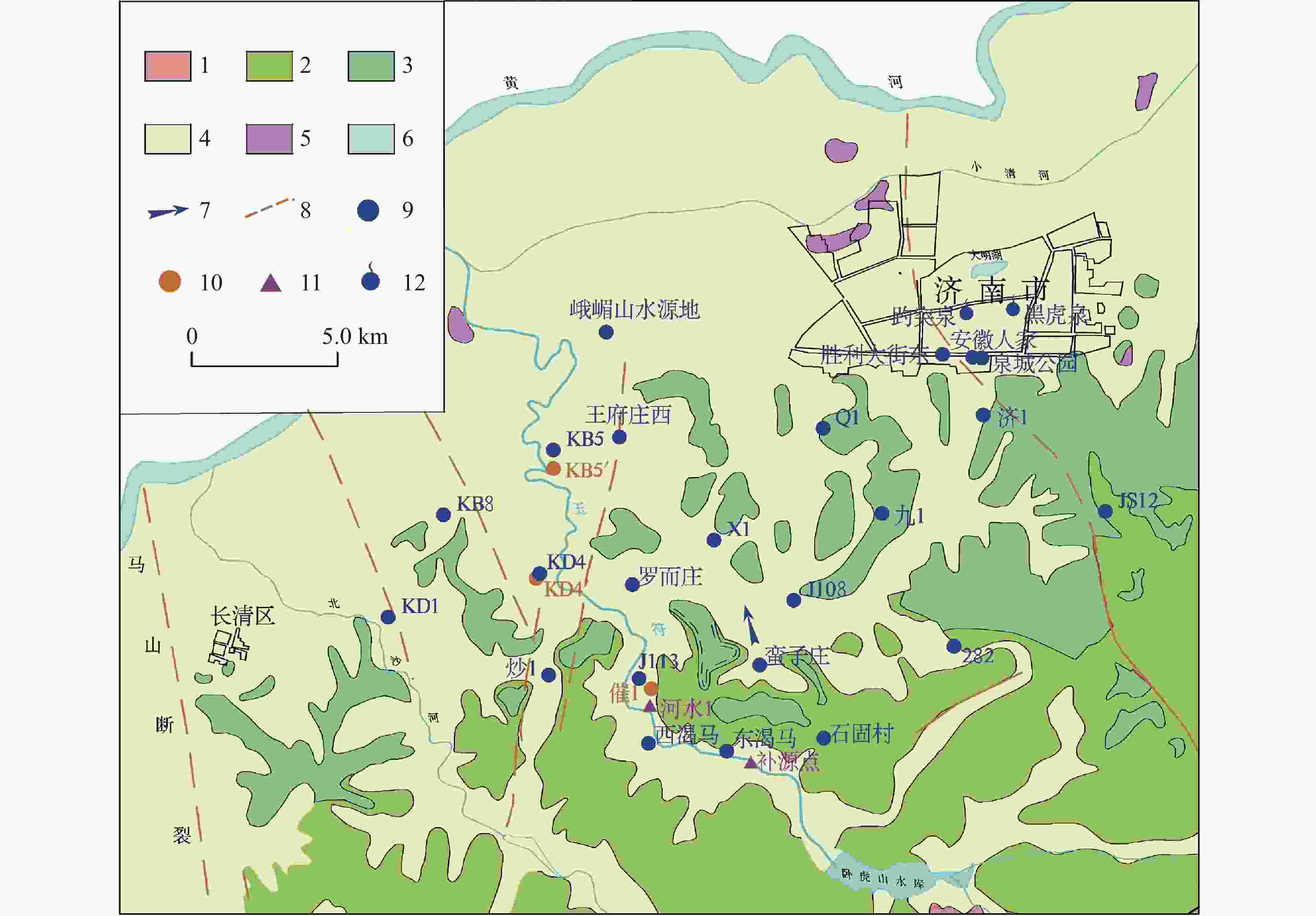
 下载:
下载:
